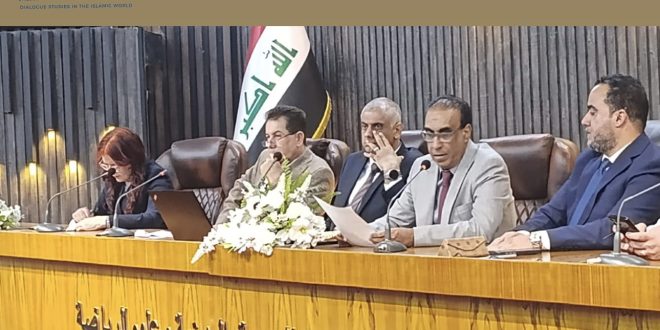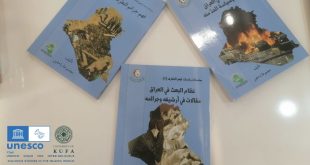Baghdad – Thursday, October 2, 2025
The Ministry of Higher Education and Scientific Research, in cooperation with the UNESCO Office in Baghdad, concluded the proceedings of the International General Conference of UNESCO Chairs in Iraq, hosted by the University of Baghdad over two days, with broad participation from researchers, academics, and representatives of Iraqi, Arab, and international universities.
The closing day featured scholarly sessions presented by Iraq’s four UNESCO Chairs, with contributions from a number of Iraqi and foreign universities. The University of Kufa focused its session on “UNESCO Chairs and Interreligious and Intercultural Dialogue and Pluralism: Prospects, Challenges, and Future Visions.” The University of Baghdad devoted its session to the Palestinian cause, while the University of Mosul discussed “Towards Comprehensive Strategies to Strengthen Social Cohesion.” The American University of Baghdad, in turn, highlighted the theme of “Quality Education for Sustainable Health Equity.”
The sessions of the UNESCO Chair at the conference’s second and final day, Thursday, October 2, 2025, unfolded as follows:
The Third Session, entitled “International and Local Experiences in Integrating the Principles of Peaceful Coexistence and Dialogue into Educational Curricula,” was chaired by Dr. Alaa Shatnan, Director of the UNESCO Chair. The session hosted eight participants from both local and international institutions, who presented diverse experiences from Iraqi universities—such as the Universities of Kufa, Kirkuk, and Salahaddin—as well as from academic and educational institutions in Sweden and France, discussing how to embed the values of interfaith and intercultural dialogue and peaceful coexistence within university, secondary, and private school curricula.
The Fourth Session, entitled “Interreligious and Intercultural Dialogue and Pluralism: Horizons of Development and Future Challenges,” was also chaired by Dr. Alaa Shatnan, and featured several research papers exploring the principal prospects, expectations, and challenges surrounding the development of interfaith and intercultural dialogue. The presentations drew upon the experiences of UNESCO Chairs worldwide, as well as academic institutions and civil society organizations with shared missions in Iraq and beyond.
Before the conference came to its conclusion, a final plenary session was convened, during which the recommendations of each of the four UNESCO Chairs in Iraq were read aloud. The recommendations of the UNESCO Chair for Interreligious Dialogue at the University of Kufa, delivered by Dr. Alaa Shatnan, were as follows:
- Strengthening National Cohesion in Iraq
- Supporting national unity through the consolidation of peaceful coexistence among the country’s diverse communities.
- Adopting strategies to safeguard national peace, including the promotion of studies and academic activities in the University of Kufa and similar institutions.
- International Cooperation among UNESCO Chairs
- Reinforcing communication and coordination among members of the international UNESCO Chairs network in the fields of interreligious and intercultural dialogue and peaceful coexistence.
- Exchanging expertise to enhance community security and resilience.
- Integrating Dialogue and Coexistence into Educational Curricula
- Inviting Iraqi educational institutions to draw upon international experiences in embedding the principles of dialogue and acceptance of the Other within educational programs.
- Appealing to local and international bodies to adopt these principles across all educational levels.
- Activating the Role of UNESCO Chairs and Civil Society Organizations
- Promoting a culture of dialogue and peaceful coexistence through the exchange of international experiences.
- Studying current challenges and obstacles while proposing practical solutions within the framework of the Network for Interreligious and Intercultural Dialogue.
At the close of the conference, participants emphasized the importance of bolstering the role of UNESCO Chairs in Iraq as dynamic platforms for advancing scientific research and nurturing intercultural and intellectual dialogue. They stressed the need for continued international collaboration among these Chairs, their global counterparts, and UNESCO itself—so as to further the causes of sustainable development and to strengthen social peace in Iraq and across the world.
This initiative embodies a number of UNESCO’s Sustainable Development Goals, particularly those calling for quality education, the reduction of inequalities, and partnerships for the achievement of shared educational objectives—with special emphasis on peaceful coexistence, interreligious and intercultural dialogue, and the protection of human rights.
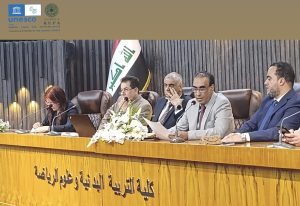
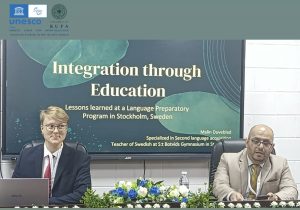
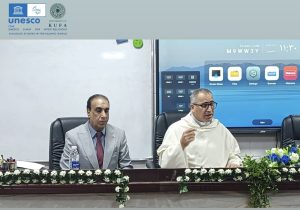
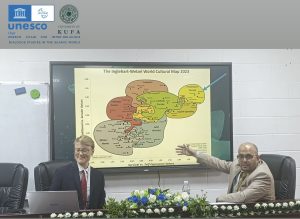
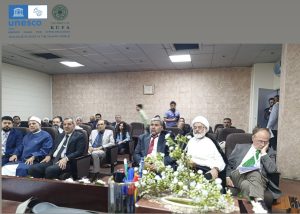
 UNESCO CHAIR For Inter-Religious Dialogue Studies in The Islamic World
UNESCO CHAIR For Inter-Religious Dialogue Studies in The Islamic World
